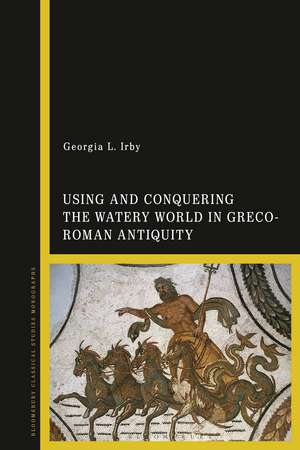Using and Conquering the Watery World in Greco-Roman Antiquity
Autor Georgia L. Irbyen Limba Engleză Paperback – 28 dec 2022
| Toate formatele și edițiile | Preț | Express |
|---|---|---|
| Paperback (1) | 193.36 lei 6-8 săpt. | |
| Bloomsbury Publishing – 28 dec 2022 | 193.36 lei 6-8 săpt. | |
| Hardback (1) | 570.93 lei 6-8 săpt. | |
| Bloomsbury Publishing – 11 aug 2021 | 570.93 lei 6-8 săpt. |
Preț: 193.36 lei
Preț vechi: 250.45 lei
-23% Nou
Puncte Express: 290
Preț estimativ în valută:
36.100€ • 40.32$ • 31.18£
36.100€ • 40.32$ • 31.18£
Carte tipărită la comandă
Livrare economică 24 aprilie-08 mai
Preluare comenzi: 021 569.72.76
Specificații
ISBN-13: 9781350250789
ISBN-10: 1350250783
Pagini: 312
Ilustrații: 27 bw illus
Dimensiuni: 156 x 234 x 25 mm
Greutate: 0.44 kg
Editura: Bloomsbury Publishing
Colecția Bloomsbury Academic
Locul publicării:London, United Kingdom
ISBN-10: 1350250783
Pagini: 312
Ilustrații: 27 bw illus
Dimensiuni: 156 x 234 x 25 mm
Greutate: 0.44 kg
Editura: Bloomsbury Publishing
Colecția Bloomsbury Academic
Locul publicării:London, United Kingdom
Caracteristici
A companion volume to Irby's Conceptions of the Watery World in Graeco-Roman Antiquity
Notă biografică
Georgia L. Irby is Professor of Classical Studies at William and Mary, USA. Her many books include Military Religion in Roman Britain (1999), Greek Science of the Hellenistic Era: A Sourcebook (edited with Paul Keyser, 2002), Encyclopedia of Ancient Natural Scientists: The Greek Tradition and its Many Heirs (edited with Paul Keyser, 2008), A New Latin Primer (with Mary C. English, 2015) and A Companion to Science, Technology and Medicine in Ancient Greece and Rome (2 volumes, 2016).
Cuprins
AbbreviationsFigures and MapsAcknowledgements 1: Introduction: Using and Conquering the Watery World Controlling and Harnessing Water2: Water Rights3: Water Quality and Urban Planning4: Urban Hydraulic Engineering5: Maritime Hydraulic Engineering Engaging with the Watery World6: Sailing and Navigating 7: Maritime Trade and Travel8: Harvesting the "Barren" Sea The Sea and "National" Identity: The political manipulation of the Watery World9: Minoan Thalassocracy, Archaic Expansion, and Maritime Iconography10: Hellenic and Hellenistic Thalassocracies11: Rome: Oceanus Domitus12: Conclusion Appendix of Major Writers and ThinkersNotes BibliographyIndex
Recenzii
The major contribution of this project may well be that it reminds us forcefully of how crucial water was to our Greco-Roman ancestors, how dangerous it could be when things went wrong and how much ingenuity was developed by them to use it productively.
Conceptions of the Watery-World in Greco-Roman Antiquity together with Using and Conquering the Watery-World in Greco-Roman Antiquity aim to be a definitive resource on all things 'watery' in the ancient Mediterranean. The sheer scope and level of detail makes these works incredibly useful for scholars of water in the ancient environment, while the careful discussion of water in its context is relevant for anyone with a broader interest in the natural environment ... If you need anything to do with water in Graeco-Roman antiquity, chances are you can find it in these two volumes!
[T]he book will serve as a useful resource of first resort for student research topics or for instructors seeking a quick knowledge boost across the vastness of the watery landscape in Greek and Roman studies.
Conceptions of the Watery-World in Greco-Roman Antiquity together with Using and Conquering the Watery-World in Greco-Roman Antiquity aim to be a definitive resource on all things 'watery' in the ancient Mediterranean. The sheer scope and level of detail makes these works incredibly useful for scholars of water in the ancient environment, while the careful discussion of water in its context is relevant for anyone with a broader interest in the natural environment ... If you need anything to do with water in Graeco-Roman antiquity, chances are you can find it in these two volumes!
[T]he book will serve as a useful resource of first resort for student research topics or for instructors seeking a quick knowledge boost across the vastness of the watery landscape in Greek and Roman studies.
